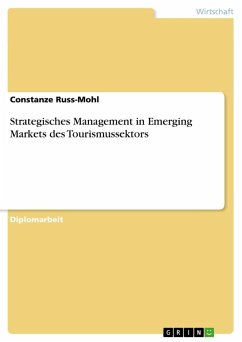Diplomarbeit aus dem Jahr 2007 im Fachbereich BWL - Sonstiges, Note: gut, Universität Konstanz, 91 Quellen im Literaturverzeichnis, Sprache: Deutsch, Abstract: China and India s political opening, their fast growing economies, and the subsequent rising incomes of the citizens are opening up powerful new markets. Tourism constitutes one of the quickly evolving sectors. So far little research of strategic management in these emerging tourism markets has been conducted. Goal of this study is to display the German National Tourist Organization s and Switzerland Tourism s strategic management as they are trying to market their home country as a destination for tourists from the emerging markets of China and India respectively. An explanatory model was created to be able to analyze and identify macro-environmental, industry-specific, and organization-specific factors that influence strategic management in these markets. Research was conducted on the basis of a documentary analysis and complementary interviews with the responsible managers of the two National Tourism Offices as well as other experts from the industry. Results show that both national tourism organizations use similar differentiation strategies, marketing their country as a destination by the use of themes, independently of the market s characteristics, such as size and growth rate. The reason seems to be that they are able to neglect the external threat caused by the threat of substitutes and customers negotiating power in their management strategies. However, the importance and power of informal networks - especially in Asian markets - and the small financial budgets seem to be the key factors explaining why national tourism organizations choose the use of multiplier effects as a strategy to market their country especially in emerging tourism markets. This strategy focuses marketing activity on approaching intermediaries, such as tour operators or media, instead of the final consumer (tourist) as it is practiced in established markets.
Hinweis: Dieser Artikel kann nur an eine deutsche Lieferadresse ausgeliefert werden.
Hinweis: Dieser Artikel kann nur an eine deutsche Lieferadresse ausgeliefert werden.








